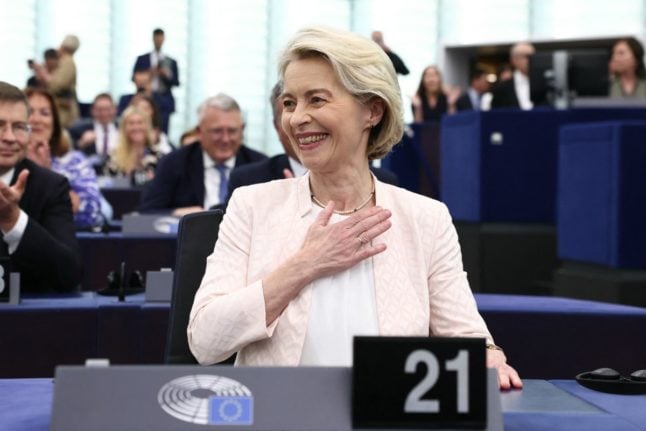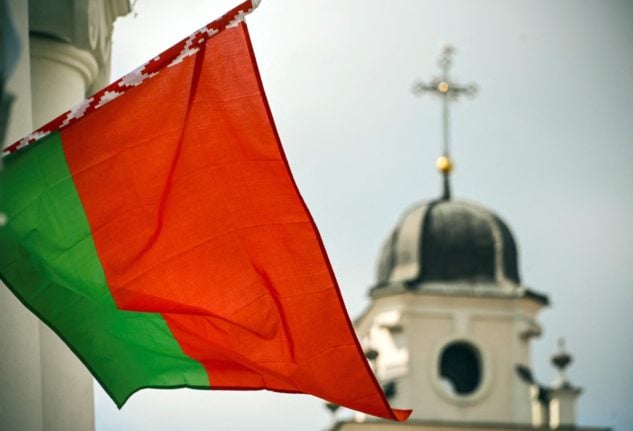The German ex-defence minister, who became the first woman leader of the European Commission in 2019, had presented herself as the best and most experienced captain to steer the commission.
Von der Leyen received votes backing her from 401 MEPs in the 720-seat chamber in the French city of Strasbourg — over the 361-vote majority she needed to remain head of the EU’s executive body.
There were 284 lawmakers who voted against in the secret ballot, held during the first parliamentary session since EU-wide elections in June.
An elated von der Leyen pumped fists in the air after parliament speaker Roberta Metsola announced the result.
She later said it was “a very emotional and special moment for me” and the result “sends a strong message of confidence”.
Von der Leyen’s first term was full of crises including the coronavirus pandemic and the outbreak of war in Ukraine.
“We have navigated the most troubled waters that our union has ever faced,” she told reporters.
Von der Leyen however faces another difficult five years, with rising expectations that former US president Donald Trump will return to the White House after elections later this year.
And with conflicts in and near Europe, von der Leyen insisted on the need for a “strong Europe” during a “period of deep anxiety and uncertainty”.
Other issues in her in-tray are the risk of a wider conflict in the Middle East and the EU’s trade tensions with China.
5 more years.
I can’t begin to express how grateful I am for the trust of all MEPs that voted for me. pic.twitter.com/d9n3yfIVtS
— Ursula von der Leyen (@vonderleyen) July 18, 2024
Not a ‘blank cheque’
European leaders were quick to offer their congratulations.
British Prime Minister Keir Starmer, whose recent victory has many hoping for better EU-UK ties, said on X: “I look forward to working closely with you to reset the relationship between the UK and the European Union.”
German Chancellor Olaf Scholz and Polish Prime Minister Donald Tusk hailed the result, vowing she would deliver for Europe.
Von der Leyen’s re-election was “a clear sign of our ability to act in the European Union, especially in difficult times,” Scholz said.
“Times are hard, but with your courage and determination, I’m sure you’ll do a great job. We will do, together,” Tusk, an ex-top EU official, said.
Reaching this point had been rocky. The EU’s 27 leaders fiercely debated her candidacy in June before putting von der Leyen’s name forward as their continuity pick.
Von der Leyen belongs to the biggest political group in the parliament, the conservative European People’s Party, which is in a centrist coalition with the Socialists and Democrats and the liberal Renew Europe groups.
She spent weeks seeking to convince different parties to give her support.
Despite the Socialists and Democrats group backing her, the group stressed it did not mean a “blank cheque”.
“Our job begins now. We will continue working to put our social imprint in all EU policies for the next five years,” the group’s leader, Iratxe Garcia Perez, said in a statement.
Boosting competitivity
Von der Leyen vowed earlier on Thursday to boost Europe’s competitiveness by ensuring major investment in key industries including defence.
But she also insisted the EU would not deviate from ambitious climate goals that entail reducing greenhouse gas emissions by 90 percent by 2040.
She said she would create a new commissioner to tackle Europe’s housing crisis, strengthen the EU’s border agency Frontex, triple the number of border guards and reinforce the bloc’s efforts against disinformation.
Her promises to better defend the EU’s borders sought to satisfy her EPP allies but also the far-right ECR group dominated by Italian Prime Minister Giorgia Meloni’s party.
Now von der Leyen will have to get to work choosing her next cabinet of commissioners to work on EU policy.
Once she has named her team, they, too, will have to face the parliament for confirmation hearings in the autumn.



 Please whitelist us to continue reading.
Please whitelist us to continue reading.
Member comments